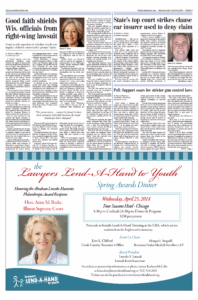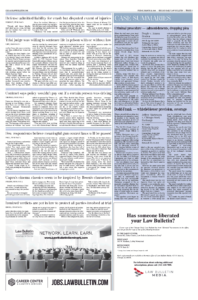State’s top court strikes clause car insurer used to deny claim

The Chicago Daily Law Bulletin published this piece in print on Friday, March 23, 2018. The jump is below.
Published by the Chicago Daily Law Bulletin on March 23, 2018
By Rebecca Anzel
Law Bulletin correspondent
SPRINGFIELD — The car insurance policy said it would not pay out if a specific driver was behind the wheel, and it did not — even when the crash happened in a separate car.
Now Illinois’ high court has called foul on the named driver exclusion clause, ruling the line in the contract violated public policy.
Plaintiff Phougeun Thounsavath was the passenger in a car owned and insured by her friend Clinton Evans during a crash in 2012. When his policy was not enough to cover her medical bills, she filed an underinsurance liability claim through her policy with State Farm Mutual Automobile Insurance Co. They denied the claim because her policy specifically names Evans as barred from coverage.
But that does not comply with the state’s mandatory insurance requirements, Justice Robert R. Thomaswrote in the opinion.
“Once a person qualifies as an insured for purposes of the policy’s bodily injury liability provisions, she must be treated as an insured for purposes of uninsured and underinsured motorist coverage as well,” he wrote.
Thounsavath had two insurance policies with the company, both containing language that specifically excluded Evans from coverage.
“It is agreed we shall not be liable and no liability or obligation of any kind shall attach to us for bodily injury, loss or damage under any of the coverages of this policy while any motor vehicle is operated by: Clinton M. Evans,” according to the contract.
In June 2012, Thounsavath was a passenger in a vehicular collision involving Evans, who was driving his own car insured with his own $20,000 policy. Her medical bills totaled $30,000, two-thirds of which she paid with the money she was awarded from Evans’ insurance company.
State Farm denied her claim for the remaining $10,000 because her policy specifically named Evans as an exclusion to coverage. The company claimed that it did not matter Evans was driving his own car — because he was driving a vehicle, State Farm was not liable for any medical damages Thounsavath sustained.
The 1st District Appellate Court, which decided State Farm could not use the driver exclusion clause in Thounsavath’s policy as a reason to deny her coverage in this case.
During oral arguments, Thomas called the clause “very poorly written.” The language makes a general reference to whether “any motor vehicle is operated by” Evans — it does not stipulate whose car or if Thounsavath has to be in the car.
The company’s attorney, Frank C. Stevens of Taylor Miller LLC, declined to comment. But in oral arguments, he maintained that the plaintiff would not be successful in claims involving Evans in a multitude of situations, including if Evans was driving a car and struck Thounsavath as a pedestrian or if the two were driving their own vehicles and collided.
“They just didn’t want anything to do with Clinton Evans,” Stevens said. “They decided that Clinton Evans was not a risk that they wanted to insure, and they told her that, and she had an option — she could either agree to that, which she did, or she could’ve walked away and gone somewhere else.”
But that position does not comport with Illinois law, the Supreme Court decided.
“State Farm is correct that, in general, named driver exclusions are permitted in Illinois. We also agree with State Farm that it was entitled to identify Clinton Evans as an individual for whom it would not provide insurance coverage,” Thomas wrote in the opinion. “However, Clinton Evans is not seeking insurance coverage from State Farm under plaintiff’s policies. It is plaintiff who is attempting to collect under her policies with State Farm.”
Thounsavath was represented by Eric J. Parker of Stotis & Baird Chtd. Parker said they are pleased with the outcome.
The case is Phoungeun Thounsavath v. State Farm Mutual Automobile Insurance Co., No. 12258.
The Chicago Daily Law Bulletin originally published this piece online here.

